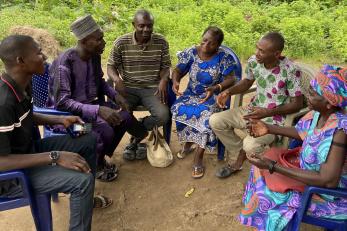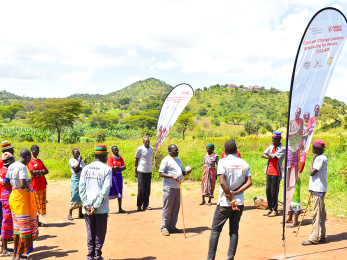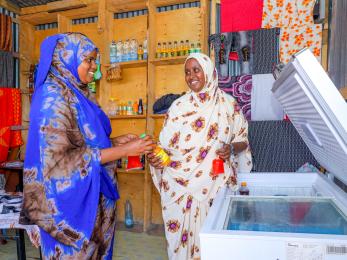Unbundling Peacebuilding
How Mediation and Community Dialogues Help Prevent and Manage Violent Conflict in North Central Nigeria

Peacebuilding interventions have long been a focus for donors and governments in efforts to stem long-term effects of conflict. Many peacebuilding interventions tend to “bundle” or combine a diverse set of peacebuilding activities together to try to address as many different types of conflict drivers and underlying causes as possible. However, this approach makes it difficult to know which parts of the bundle of peacebuilding activities impact which outcomes. This makes it difficult for practitioners and policymakers to make decisions about and improve upon the effectiveness of peacebuilding programs.
To expand upon previous research on the effects of mediation on violence, and to better understand the effects of bundled peacebuilding activities, Mercy Corps conducted a Randomized Control Trial (RCT) with the peacebuilding program Community Initiatives to Promote Peace (CIPP) in Nigeria. CIPP was a USAID-funded program that lasted from 2019 to 2024 that took a holistic, locally led approach to addressing the interconnected drivers of conflict and violence in Northern Nigeria. Unbundling Peacebuilding assesses the impacts of two different types of peacebuilding interventions at the community level: mediation training for a diverse set of community leaders, and community dialogues. We randomly assigned half of the intervention communities and half of the comparison communities from the previous CIPP RCT on interest-based mediation and negotiation (IBMN) training to receive the dialogue intervention. The community dialogues brought conflicting groups together to discuss perceptions of the conflict and to build stronger ties between groups. The RCT found:
The effects of the IBMN training on reducing violence and insecurity persisted over three years since the initial mediation intervention.
- In communities where leaders received mediation training and light-touch coaching/mentoring, individuals are significantly less likely to have experienced violent events or to avoid traveling to specific areas due to fear of violence.
Training community leaders in IBMN led to an increase in inter-group social cohesion.
- Individuals living in communities in which leaders participated in the mediation training intervention were more likely to report positive interactions with and trust in members of out-groups relative to individuals living in communities that received no intervention or those that received the dialogue intervention only.
In this study, community dialogues had little impact on violence, insecurity, or social cohesion.
- We observed few significant differences between those who received the dialogues and those who did not on either security or social cohesion outcomes. We attribute the lack of an effect to the design and implementation of the intervention in this context, where the focus was to include many different people in one-off dialogue events.
From these findings, governments, donors, civil society, and implementing actors should consider the following for future peacebuilding programs:
- Continue to invest in improving the mediation capabilities of local leaders since local leaders, with the right tools, can be effective at reducing violence and improving security.
- Consider more intensive dialogue interventions with influencers to promote greater attitudinal and behavioral change since dialogues involving the same well-connected individuals over time provide people with sufficient opportunity to learn about each other, understand each other’s perspectives, and begin to formulate a new group identity.
- Incorporate evidence from behavioral science into programs to support broader societal change since behavioral science provides insights into how change moves from individuals to the collective.

